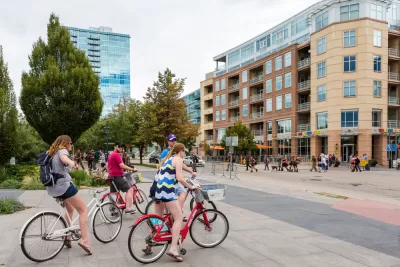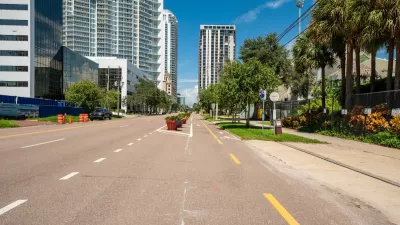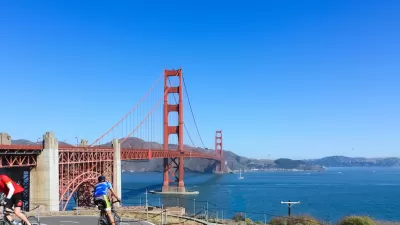In addition to reducing air pollution and congestion, improving bike infrastructure could save thousands of lives each year, according to new research.

A new study that models the "comprehensive global public health impacts of the mode shift to cycling" found that replacing car trips with bike trips can prevent over 15,000 deaths per year in the U.S. alone, reports Kea Wilson for Streetsblog.
The study analyzed rates of premature deaths due to car crashes and pollution-related disease, as well as how many car trips could be replaced with robust investment in bike infrastructure and other incentives.
Even if just 8 percent of those new bike trips replaced journeys in a car — an extraordinarily conservative estimate, considering that in this hypothetical world, every urban area in the world would be outfitted with Amsterdam-levels of bike lanes — researchers say that 18,589 lives could be saved across the globe, 1,227 of which would be in the U.S. alone.
Meanwhile, even people not using bikes would benefit from improved air quality, reduced congestion, and better overall mobility. "In addition to the impacts modeled in his study, [study author David] Rojas points out that bikeable communities typically have more green space, more real estate to devote to affordable housing, healthy food providers, and other essential services in every neighborhood, and lower levels of noise pollution, all of which have an impact on the physical and mental health of their residents."
FULL STORY: STUDY: Better Bike Policy Could Prevent 15K U.S. Deaths Every Year — And Not Just in Crashes

Alabama: Trump Terminates Settlements for Black Communities Harmed By Raw Sewage
Trump deemed the landmark civil rights agreement “illegal DEI and environmental justice policy.”

Study: Maui’s Plan to Convert Vacation Rentals to Long-Term Housing Could Cause Nearly $1 Billion Economic Loss
The plan would reduce visitor accommodation by 25% resulting in 1,900 jobs lost.

Planetizen Federal Action Tracker
A weekly monitor of how Trump’s orders and actions are impacting planners and planning in America.

Waymo Gets Permission to Map SF’s Market Street
If allowed to operate on the traffic-restricted street, Waymo’s autonomous taxis would have a leg up over ride-hailing competitors — and counter the city’s efforts to grow bike and pedestrian on the thoroughfare.

Parklet Symposium Highlights the Success of Shared Spaces
Parklets got a boost during the Covid-19 pandemic, when the concept was translated to outdoor dining programs that offered restaurants a lifeline during the shutdown.

Federal Homelessness Agency Places Entire Staff on Leave
The U.S. Interagency Council on Homelessness is the only federal agency dedicated to preventing and ending homelessness.
Urban Design for Planners 1: Software Tools
This six-course series explores essential urban design concepts using open source software and equips planners with the tools they need to participate fully in the urban design process.
Planning for Universal Design
Learn the tools for implementing Universal Design in planning regulations.
Caltrans
Smith Gee Studio
Institute for Housing and Urban Development Studies (IHS)
City of Grandview
Harvard GSD Executive Education
Toledo-Lucas County Plan Commissions
Salt Lake City
NYU Wagner Graduate School of Public Service





























